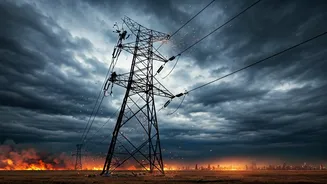Power Grid Under Siege
Recent developments reveal a dire situation in northern Ukraine, where the power grid is under relentless assault. Russian forces have launched a series
of strikes aimed at crippling the country's energy infrastructure. These attacks have caused widespread blackouts, leaving many communities without electricity. The scale of the damage is extensive, with crucial components of the power grid, such as substations and transmission lines, being heavily affected. These strikes are not isolated events but rather part of a larger strategy to degrade Ukraine's ability to function and to weaken its resolve. The deliberate targeting of civilian infrastructure represents a serious violation of international norms. The consequences of these attacks are far-reaching, affecting not only homes and businesses but also essential services like hospitals and schools.
Drone Attacks Hamper Repairs
The aftermath of the Russian strikes has presented further challenges, as ongoing drone assaults are now obstructing the vital repair efforts. Even as crews attempt to assess the damage and begin restoration work, they face constant threats from these unmanned aerial vehicles. These drone attacks are designed to inflict further damage and to demoralize and prevent workers from restoring the power grid. They create a dangerous environment, making it risky for engineers and technicians to work on repairing damaged infrastructure. This dual assault – initial strikes followed by drone attacks – is part of a deliberate strategy to prolong the suffering of the Ukrainian people and to disrupt critical services. The attacks have forced repair teams to halt their efforts, making it difficult to assess the scope of the damage and implement necessary repairs, slowing down the process of restoring power to affected areas.
Impact on Civilians
The impact of the power outages caused by the Russian strikes is being felt most acutely by civilians, whose daily lives have been thrown into disarray. Without electricity, homes are plunged into darkness, and basic services like heating and water supply become unreliable. Businesses suffer significant losses, and economic activity declines. Furthermore, hospitals and other critical facilities face challenges as they struggle to maintain essential services. The overall quality of life is severely impacted, with residents facing increased stress and hardship. The situation also raises concerns about public safety, as the lack of power can affect security systems and lighting, making communities more vulnerable. The power outages have a cascading effect, disrupting the regular functioning of society and increasing the burden on local authorities to provide support to those affected by these attacks.
International Response
The international community has condemned the Russian attacks on Ukraine's energy infrastructure, denouncing them as war crimes. Various nations and international organizations have called for an immediate cessation of hostilities and for the protection of civilians and essential infrastructure. Humanitarian aid is being mobilized to provide assistance to affected populations, including aid to ensure access to essential services and resources. Discussions are underway to coordinate efforts to provide technical assistance, equipment, and financial support to aid in the restoration of the power grid. The goal is to help Ukraine rebuild its infrastructure and to provide humanitarian assistance. The international community's response underscores the importance of upholding international law and protecting civilian populations during times of conflict.















